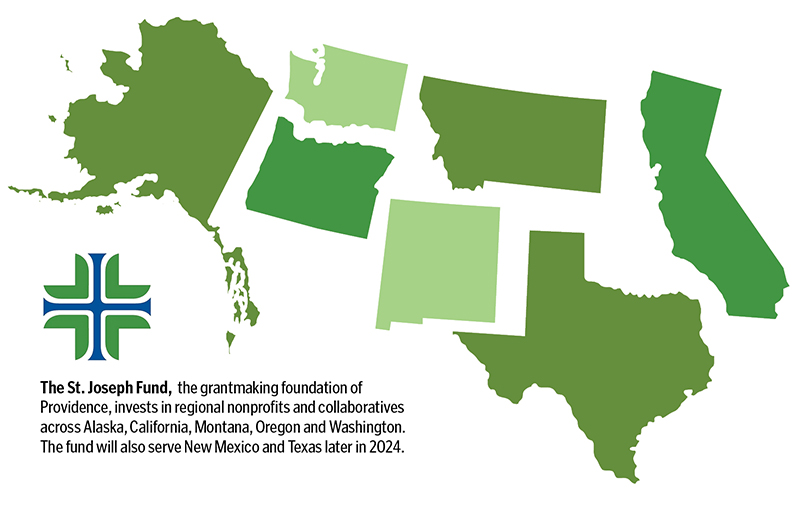
Every day, I wake up with a deep sense of purpose: to play a role in nurturing communities, particularly those marginalized and underserved, so that they may thrive, find healing, and grow in love, hope and fulfillment. Over 35 years ago, the Sisters of St. Joseph of Orange had a similar vision when they founded the St. Joseph Fund. Their mission was clear: Every individual must be healthy for society to flourish.
The St. Joseph Fund, based in Irvine, California, is the grantmaking foundation of Providence, and we serve communities in five western states: Alaska, California, Montana, Oregon and Washington. The fund will also serve New Mexico and Texas later in 2024. We don't simply hand out grants to temporarily relieve isolated challenges. Instead, our work is deeply rooted in love as we continue to be partners even after the grants are awarded, fostering positive outcomes that contribute to a profound sense of fulfillment and satisfaction.
Throughout my years of involvement, I've witnessed firsthand the deep impact on communities and society when our foundation centers our efforts on building organizational power. We accomplish this by addressing complex issues through methods that deviate from the conventional grantmaking model of just funding and supporting initiatives with community partners during a grant term. We empower change agents for the specific problem and other challenges facing the community.
Other grant-making organizations we've partnered with have also experienced transformative results. For instance, The California Endowment's decade-long "Building Healthy Communities" initiative revealed that nurturing community power holds the potential for systemic change over the long term. This approach departs from top-down initiatives that often maintain the status quo or provide only minor enhancements to underserved communities.1
START WITH INCLUSIVITY, CULTURAL COMPETENCY AND EMPOWERMENT
Community power-building rests upon the foundational principles of inclusivity, cultural competency and empowerment. Unlike traditional transactional models, where a grant
is given and a recipient reports, community-building positions residents and local nonprofit organizations at the forefront of shaping solutions. At the St. Joseph Fund, we believe in collaboration and co-creation, tapping into these communities'
inherent strengths and wisdom.
The planning toward community wholeness involves tailoring foundation partnerships to provide each group with support to enable capacity building, which I consider the "muscle" that drives our work. Capacity building encompasses various components, including infrastructure development, internal assessments, research, training and policy analysis, each contributing to holistic community well-being. The local nonprofit partners we've collaborated with for more than 20 years have advocated to change conditions, government policies and practices that result in neighborhood distress.
Infrastructure development, for instance, encompasses investments in physical and social infrastructure within communities, such as housing, schools and community centers. We at the fund work with specialized trainers on internal assessments to help local leaders identify strengths and areas that require development, allowing us to tailor interventions to specific community needs. These coaches are vetted by the St. Joseph Fund to ensure they represent the people they serve, having both technical and soft skills that connect with the community. Researching risk factors and interviewing neighborhood residents and leaders is essential for understanding the evolving challenges faced by communities. Once the challenges are identified, fund staffers coach community members, professionals and social service providers as they work to actively promote well-being. Policy analysis plays a pivotal role in advocating for policies that address the long-term needs of communities, such as equitable resource access and systemic reform.
A cornerstone of community power-building is the recognition of community expertise. Those who lead, live and work in communities often possess invaluable insight into their needs, challenges and solutions. By involving community members and leaders in advocating for their needs and designing programs together, we build trust, foster deep relationships and ensure solutions are tailored to the community's specific requirements.
I have witnessed the transformative power of community expertise in action — for example, in the South Park Coalition near Santa Rosa, California. This community's residents harnessed their collective abilities to advocate for and improve their underserved area. After surveying other residents in December 2020, the coalition identified and brought to city officials' attention the primary issues affecting their community: safety, crime, homelessness and illegal dumping.
The team and other residents designed a plan for enhancing safety, cleanliness and accessibility in and around the park. To achieve this, they strengthened the relationship between the police and the community, established processes for reporting crime by sharing information quickly for a rapid response when necessary, and improved park infrastructure, such as painting murals and planting community gardens. Their ongoing advocacy efforts include pushing for additional safety enhancements like better lighting and reduced driving speed on streets around the park.
Today, South Park stands as a neighborhood with strong community leaders actively creating positive change through the power of the community. Their work is grounded in a profound love for their residents, area and future generations. "One of the important things I've learned from the coalition is the courage to talk to my neighbors. I'm not afraid of strangers so much anymore. The other thing I've learned is how to become a squeaky wheel. I have the means to talk to the city and county officials to let them know what will make us happy and safe," said Jennie Orvino, a coalition member and South Park resident for 16 years.

STAY INVESTED BEYOND THE GRANT PERIOD
A distinctive feature of our approach is our commitment to remain engaged with communities long after the grant period concludes. This commitment ensures our initiatives' sustainability and lasting
impact by encompassing physical, mental and emotional well-being. One example of our allegiance to this approach is when our foundation joined forces in 2016 with the Prevention Institute to better understand health systems' challenges in building
community power and explore a path for advancing upstream health-equity-driven efforts.
Although the initial term of our partnership was three years, we continued to walk alongside the Prevention Institute for several more years through our Intersections Initiative. Through this program, seven coalitions assist hospitals in devising strategies to address community health issues focused on housing, education, civic involvement and economic stability that complement clinical coordination and population health efforts throughout the health care system.2 Together, we identify the problems with the most community-led support, define strategies for impactful and equitable change, and ensure they have the right partners to lead to the most favorable outcomes.
CREATE AGENTS OF CHANGE
A recent report published in the Journal of Public Health Management & Practice highlights the growing awareness of how complex social conditions shape health outcomes and power's pivotal role
in driving health equities. The findings suggest that the health care industry should embrace new practices, scale up promising approaches and evaluate what works to shift power for the greater good.3
Consider the residents of North Adelanto, a predominantly Spanish-speaking San Bernardino County community located in the high desert region of Southern California. In early 2020, at the start of the COVID-19 pandemic, they became concerned when they noticed their water was discolored, smelled odd and tasted strange. Their dismay grew as they received little to no response from the city's water department and provider.
Multiple community groups composed of community organizers, scientists, politicians, professors, students and Adelanto residents came together to form the Adelanto Water Justice Coalition in 2022.4 During a city council meeting, they presented their findings and outlined recommendations that could be actively taken to address the city's water quality issues. Their recommendations included establishing a water quality board to ensure accountability and transparency regarding residents' water health and improvements to the water company's website, providing information in both English and Spanish.
By listening to the community and encouraging residents with coaching about how to share their stories with local leaders, community members became leaders in the quest for equitable access to safe and clean water. These agents of change continue to work tirelessly to improve the health and quality of life of the people in Adelanto, mitigating the long-term, significant harm caused by water injustice.
THINK ABOUT COLLABORATION DIFFERENTLY
The path ahead demands collaborative endeavors to reshape the broader system, steering it toward a sustainable, community-centric model for the long term. This journey requires a shift in perspective
and changes in policies and resource allocation. It necessitates a steadfast commitment to address the root causes of disparities in physical, mental and emotional well-being.
Taking proactive measures to bridge the health disparity divide is not merely an option but an urgent imperative. We must ensure everyone can access the necessary resources to nurture their emotional well-being. The route to wholeness within communities that have been marginalized and underserved involves embracing enduring, community-focused strategies and holistic care.
I implore organizations and individuals of all kinds to critically evaluate their current practices and actively seek forward-looking, community-building solutions that encompass physical, mental and emotional wellness. Together, we can transform communities, empower individuals and lay the foundation for a more equitable and healthier future. The time for action is upon us, and the potential for profound, transformative change is well within our grasp.
GABRIELA ROBLES is president of the St. Joseph Fund, the grantmaking foundation of Providence. The fund's work is rooted in love, providing grants and resources for underserved communities as part of Providence St. Joseph Health's mission to provide services and care for all.
NOTES
- "Building Partnerships and Power for the Future: Insights From the Intersections Initiative," The Prevention Institute, June 2023, https://preventioninstitute.org/sites/default/files/publications/PI_Intersections_Initiative_Report_June%202023%20Final.pdf.
- "Intersections Initiative," Prevention Institute, https://www.preventioninstitute.org/intersections-initiative.
- Jonathan C. Heller et al., "Theory in Action: Public Health and Community Power Building for Health Equity," Journal of Public Health Management & Practice 29, no. 1 (January/February 2023): 33-38, https://doi.org/10.1097/PHH.0000000000001681.
- Adelanto Water Justice Coalition, https://www.adelantowaterjustice.com.
QUESTIONS FOR DISCUSSIONCatholic health care has long advocated for listening to the needs of those in the communities we serve and has been vocal in saying that sustained change takes will, trust, time and resources. St. Joseph Fund President Gabriela Robles explains some of the specific ways the fund, started by the Sisters of St. Joseph of Orange, goes beyond awarding grants to foster and sustain relationships when working for community improvements across Providence. 1. Were you familiar with the concept of community power building? What aspect of the approach by the St. Joseph Fund strikes you as most beneficial to strengthening healthier communities? 2. As described in the article, the St. Joseph Fund believes in co-creating solutions to help a community work toward improvements sought by those who live and work there. Does your organization have roles like the fund's staffers, who can coach community partners and consider large structural change, such as advocating for policy reform? Would better communication among your existing staff — such as conversations about identified needs and how to advocate for them — be one way to work for such change? 3. The founding congregations of our ministries have a tradition of fostering bold change and often have the moral, mission-focused force to bring about needed reforms. Thinking about the legacy of those who came before you, are there steps you could pursue to advance needed reforms in your communities? |
